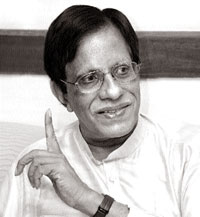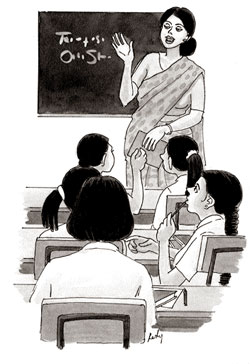Socio-political dimension of English in Sri Lanka
Revisiting the four principles underpinning the
Presidential Initiative: English as a Life Skill:
Keynote address by Presidential Advisor and
Coordinator of the Presidential Initiative on English as a Life Skill
Sunimal Fernando at the workshop on Innovative Pedagogical Practices in
the 21st Century: English in practice, organized by the Sabaragamuwa
University of Sri Lanka at Belihul Oya,
Continued from last Wednesday
Listening and speaking skills were delivered to students through
activity based teaching methods and new teaching material contained in
the new Teacher Guide on Spoken English prepared by the master trainers.
This is being followed by the ongoing development of spoken English
testing tools for public examinations, which have marked a watershed in
English teaching in our schools.
|

Sunimal Fernando |
Almost all 23,000 English language teachers too have now been
re-trained by the new leadership to deliver listening and speaking
skills to our students. The Teacher Guide compiled by them is now used
by all English teachers in Sri Lanka and even by some educational
institutions in India. As a country we are proud to say that where our
public school system is concerned today, we have all the English
language training expertise we need. We have a national cadre of 400
English language trainers distributed in all nine provinces, a product
of the Presidential Initiative.
No role for foreigners
Our national human resources in the field of English language
training are such that today we do not need to go to foreign sources
anymore - however inappropriate they may have been even in the past -
for expertise to help us train our English teachers. We commend the
Higher Education Ministry for making the fullest use of the new ELT
expertise of the master trainers of the Presidential Initiative in their
nationwide programme to provide English language skills to new
university entrants this year.
English drive without political sensitivity - a recipe for failure
The Fourth Principle: Balancing the speed of English Language Skill
Dissemination with the Norm of Social Equity
English skills are in great demand in Sri Lankan society and almost
all people want to know English. This is largely because of the
sociological value placed on English in our society. It is also because
of its increasing requirement as a qualifier for employment. Its growing
relevance for accessing knowledge and information from an increasingly
globalized outside world also cannot be denied. Employment opportunities
in the Sinhala and Tamil language administered public sector have failed
to meet the demands of the country’s aspiring youth. Hence private
sector jobs which are much sought after these days require proficiency
in English language as a qualification at most levels.
It is recognized therefore that the vast majority of Sri Lankans seek
English for employment and other reasons. The successful dissemination
of English skills to students throughout the country cannot be reached
in the near future with the human, financial and technological resources
currently available to the country. While achieving the objective of
disseminating English language skills to all students in the country is
fundamental, the harsh reality that the constraints in human and
material resources will not allow equal access to English in the
foreseeable future needs to be accepted. In this milieu it is inevitable
that the bigger urban schools will benefit at the cost of the more
distant rural schools in the country.

The need for political sensitivity
This creates a situation that needs to be handled with much political
sensitivity. The people of Sri Lanka fought for several decades at great
sacrifice to finally in 1956 dethrone English as our country’s language
of administration. English had shut the doors of the administrative
services, the professions and the technical services to 92 percent of
our people. English had hitherto blocked the path of social mobility to
Sinhala and Tamil educated people of our small towns and villages. It is
both immature and foolish to believe that the patriotic masses of our
country will allow the remnants of the old westernized, urbanized,
anti-national English speaking elites - with or without the
collaboration of their foreign intellectual and cultural masters - to
bring English back in a manner in which the social, cultural, political
and economic interests of the nationally rooted Sinhala and Tamil
speaking people are adversely affected.
An equitable approach to promotion of English
People have to be empowered with the competencies to read, write and
above all to speak in English. This is essential both for their upward
mobility as well as for the forward march of our country. Achieving the
aforesaid goal in scale will be in an environment that just cannot bear
the huge cost for doing so in the short run. Skillful management of time
frame and an almost passionate commitment to the principle of social
equity are of the highest importance. Forcing the pace of the exercise
including the pace of extending English medium education in our schools
will only inject new life into the remnants of the old English speaking
elites. It will further the creation of new English speaking elites and
progressively displace them from the cultural and emotional mainstream
of Sri Lankan life. The seeds for yet another social upheaval could be
sown, even if unintentionally, by mismanaging the delicate balance of
social equity in the country. There cannot be recourse to a
one-dimensional focus to swiftly multiply English competence in the
country without sensitivity to its social consequences. The process has
therefore to be managed with social and political sensitivity.
Promotion of English in conjunction with the national languages:
Towards a Trilingual Sri Lanka
The fourth point of departure of the Presidential Initiative
therefore was that in the socio-political context of our country English
skills can grow and be disseminated successfully not as a stand-alone
activity. English can develop only in association with a parallel
development, enrichment and dissemination activity of Sinhala and Tamil
language skills. Sinhala and Tamil cannot in any way be the victim of an
English language drive as that will be socio-politically unsustainable.
Sinhala and Tamil should be - as our mother tongue languages - and will
most certainly be the languages of discourse, discussion, debate and
intellectual interaction in the country.
Liberating knowledge from the clutches of language
Thus if we are to move towards a knowledge society, knowledge has to
be liberated from the clutches of language. Sharply focused Sinhala and
Tamil language development programmes and large scale translation
programmes should enable knowledge in all modern subjects of science and
technology, economics, management, governance systems and a host of
other subjects to be available in Sinhala and Tamil in addition to
English. In any case Sinhala and Tamil would be the languages in which
the vast majority will continue to function for very many years to come.
If they feel their interests are threatened by a politically insensitive
and forceful drive for English dissemination as has happened sometimes
in the past, they will very rightly act politically and make the English
drive a failure.
The role of English in a Trilingual Sri Lanka
Socio-politically speaking English can grow and prosper in Sri Lanka
only on the lap of Sinhala and Tamil, and never ever on its own. If
English is to be socio-politically sustainable, it must essentially be
packaged together with Sinhala and Tamil.
In other words Sinhala and Tamil have to be developed, enriched and
delivered as the country’s primary languages of discourse and
interaction, other than English only. English on the other hand should
be advocated at a different level. English must be promoted as a
culturally neutral life skill for occupation, employment and for
accessing knowledge from the outside world.
Such a packaging of English in cohort with or as an associate
language to Sinhala and Tamil is in a sense what is being designed in
the Ten Year National Plan for a Trilingual Sri Lanka which the
President will hopefully launch later this year. The Trilingual
Initiative is being drafted with socio-political sensitivity to the
socio-political dimensions of language use, practice and identity in Sri
Lanka. Sociologically speaking the dissemination of English, in the
context of the Ten Year National Plan for a Trilingual Sri Lanka is
perceived in conjunction with the parallel development and enrichment of
Sinhala and Tamil as the country’s undisputed languages of discourse and
interaction. Only an approach such as this will give English a stable
and lasting though not dominant place in the language landscape of the
country. The trilingual plan will consolidate therefore on a broad
national canvas the gains and successes of the Presidential Initiative:
English as a Life Skill.
Concluded
|



